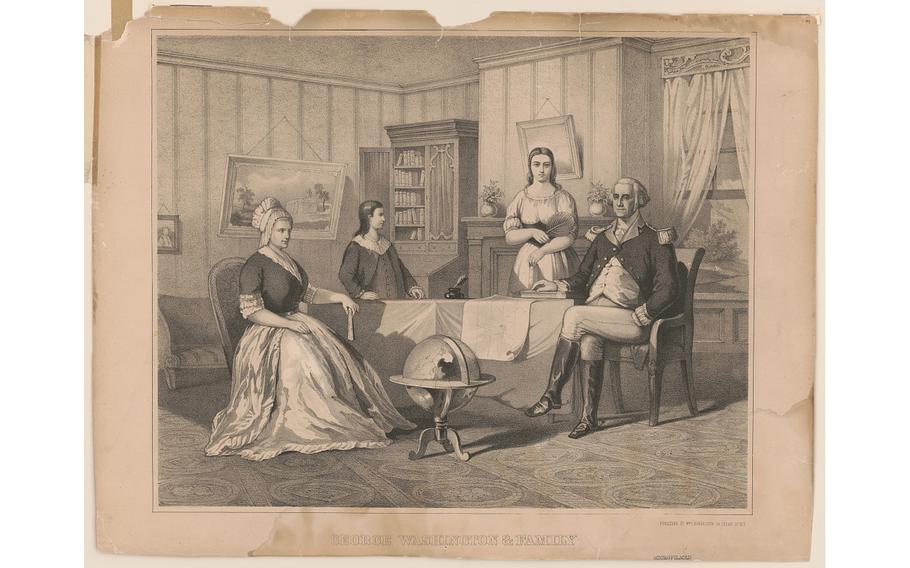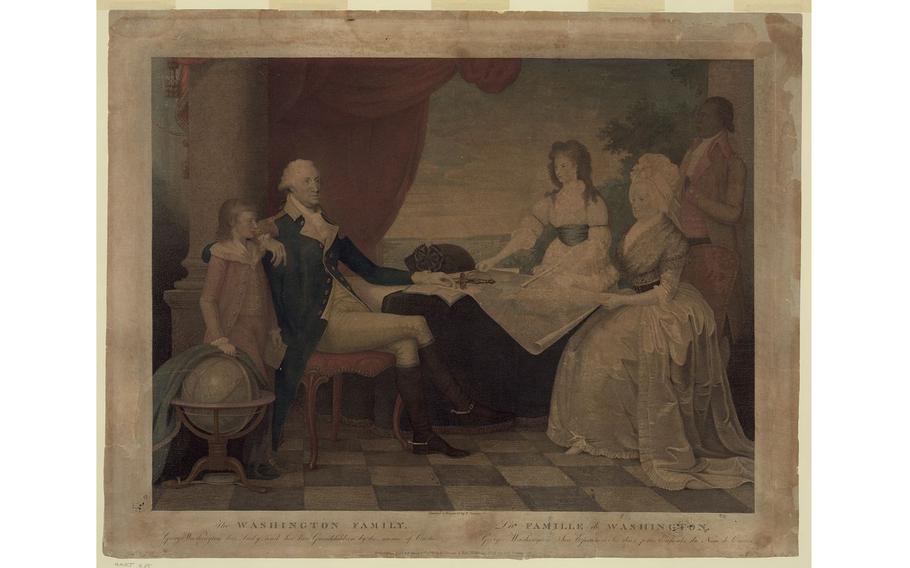
George Washington and Martha Washington raised a number of children, including grandkids. (Library of Congress)
Two weeks after George Washington’s death in December 1799, the American statesman Gouverneur Morris rose before a rapt crowd of mourners in New York and declared of the late first president: “AMERICANS! He had no child BUT YOU, and HE WAS ALL YOUR OWN.”
Washington was and is widely admired as the father of the country, but Morris’s statement ignored a well-known fact: While Washington had no biological descendants, he raised a number of children. This famous father was not some godlike, detached paternal figure. Loving and tender, Washington was closely invested in his girls’ love lives — and couldn’t, for the life of him, get his boys to finish college.
When Washington married Martha Dandridge Custis in 1759, she brought two young children from her first marriage with them to Mount Vernon: 5-year-old John “Jacky” Parke Custis and 3-year-old Martha “Patsy” Parke Custis. When the children were young, Martha made many of the parenting decisions, but as Jacky reached adolescence, Washington stepped in.
At 14, Jacky was “a boy of good genius,” Washington wrote, but to his frustration, Jacky was far more focused on hunting, fine clothes and girls than on schoolwork. At 19, Jacky announced his engagement to 15-year-old Eleanor Calvert, and Washington was not happy that Jacky would marry before finishing college and becoming financially independent. He sent Jacky to King’s College (now Columbia) in New York City to try to at least delay the match, but Jacky dropped out and got married anyway. Washington conceded defeat and said he had “yielded, contrary to my judgment.”
By then, he had also been worn down by the loss of stepdaughter Patsy, who died at 17 from what was likely an epileptic seizure. Washington, who had paid for all sorts of doctors and treatments to try to help her, knelt by her bedside praying while she lay dying.
Washington got a second chance at fatherhood, however, at the end of the American Revolution. Jacky had ventured to Yorktown in November 1781 and was struck down by camp fever, leaving his young wife a widow with four children ages 5 and younger. George and Martha took in baby George Washington “Wash” Parke Custis and 2-year-old Eleanor “Nelly” Parke Custis; the Marquis de Lafayette, whom Washington saw as another adopted son, reported that Washington “love[d] them with great tenderness.” Washington wrote in 1784 that he took pleasure in watching Wash, “fat & saucy as ever,” ride a toy horse “with a degree of boldness which will soon do honor to his horsemanship.”
Several years later, Washington was juggling the demands of fatherhood with those of the presidency, which he took on in 1789. Nelly and Wash lived with their adoptive parents in the president’s house, first in New York and then in Philadelphia. The kids accompanied the Washingtons to parades and ceremonies, and as she got older, Nelly entertained prominent guests by playing harpsichord.
But living as young celebrities — with enslaved people who were forced to wait on them and obey their commands — made it easy for Nelly and Wash to become spoiled. Moreover, Martha was particularly indulgent with the children; especially when it came to Wash, she seemed unwilling to provide discipline and boundaries. Wash’s tutor wrote in a letter that his young charge was on his way to becoming “extremely disgusting” and that Washington saw it “with pain.” But Washington worried that imposing discipline on Wash would upset Martha and refused to step in.

George Washington, Martha Washington and two of her grandchildren sit around a table. In the background at right stands William Lee, an enslaved servant to Washington. (Edward Savage/Library of Congres)
As Washington attempted to make sure that Wash completed the education Jacky never had, the frustration that welled up might have felt familiar. Washington admitted that “From [Wash’s] infancy, I have discovered an almost unconquerable disposition to indolence in every thing that did not tend to his amusements.” In other words: Wash was lazy.
Still, Washington sent him to Princeton and finally applied some discipline. In stern, formal letters, he made clear his high expectations and implied that his affection was dependent on Wash’s behavior and performance at school. He was doomed to be disappointed. Wash was ultimately asked to leave Princeton for misbehavior. Refusing to give up, Washington sent him to St. John’s College in Annapolis, where the young man tried to repeat his father’s history by forming a secret engagement. At least this time, Washington was able to stop the marriage. But he couldn’t keep Wash in school, and Wash returned home with no college degree. Washington was 0-for-2 in getting sons through college.
Fortunately, he had much smoother relationships with Nelly and her elder sisters, Betsey and Patty. The elder girls had been raised by their mother, but they, too, looked on Washington as a father figure. To Nelly, Washington was “the most affectionate of Fathers,” and his love for Betsey convinced her that she was his “best loved child.” When they reached young adulthood, he didn’t have to get them an education, but he wanted to make sure they made good marriages. Washington tailored his advice to each of the girls’ personalities.
To the passionate Betsey, he offered a reminder that “love is too dainty a food to live upon alone” and that she needed to look for someone of “good sense — good dispositions — and the means of supporting you in the way you have been brought up.” When Nelly told Washington that she had no intention of falling in love and planned to remain “Eleanor Custis Spinster,” he took time away from his presidential duties to write her a long letter pointing out the hubris of her remarks. Love was “an involuntary passion,” Washington said, and it was likely to strike whether she liked it or not. Once that happened, what should she do? He proposed a list of questions to ask herself and signed the letter wishing her “every blessing, among which a good husband when you want, & deserve one.”
Washington also expected the girls to share their feeling and fears in courtship with him. When Betsey surprised the whole family by getting engaged to an older man whom they didn’t even know she was courting — and who failed pretty much every criterion her step-grandfather had shared with her for a spouse — Washington was hurt that she hadn’t confided in him. However, he approved of the marriage and reminded her, “You know how much I love you.”
Nelly was more forthcoming, sharing with him the love letters she received when she was courting. He was delighted when Nelly married his nephew Lawrence, and he gave the couple a piece of his Mount Vernon estate.
As much as she loved him, Nelly Custis knew that Washington could come off as cold or forbidding. But he had a softer side.
“He liked to see us gay and happy,” she recalled as an adult, in a letter to a friend, noting that “I have often made him laugh heartily at the relation of my frolics and difficulties.”
Fatherhood for Washington was not always a laughing matter, but it brought the highs and lows any parent experiences. Today, it perhaps helps cast him in a more honest, human light: not just as founder but as general, president, enslaver and dad.
And if even he struggled to get his kids to do their homework, there’s some comfort in that for parents everywhere.
Cassandra A. Good is a historian and author of the new book “First Family: George Washington’s Heirs and the Making of America.”